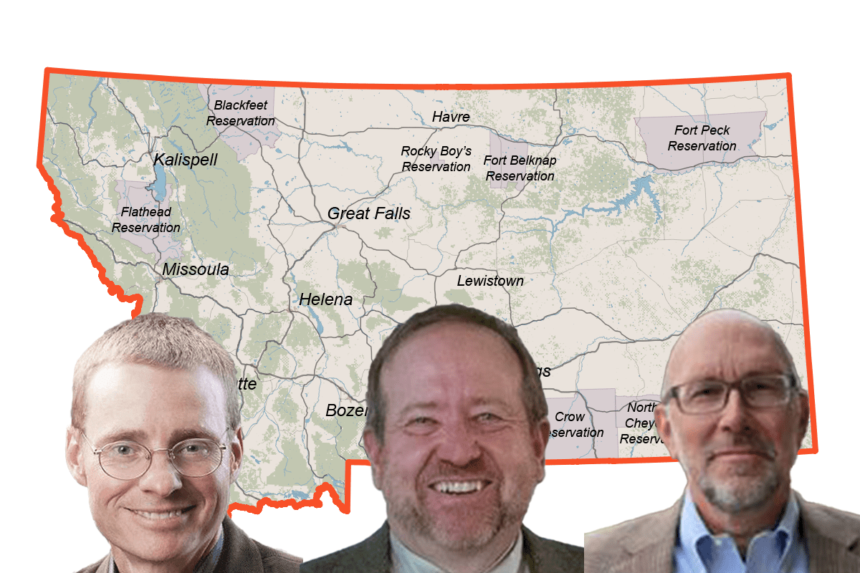A prominent attorney-turned-politician and a police officer-turned-insurance salesman are vying to become the state’s top consumer watchdog in the upcoming primary election.
The Montana state auditor is most regularly associated with its regulation of insurance companies operating in Montana, but it also investigates and prosecutes fraud in the financial industry and works on consumer education and protection initiatives. The office also regularly serves as a political launchpad: Republican Matt Rosendale was elected to U.S. Congress in 2020 after declining to run for a second four-year term as state auditor, and sitting auditor Troy Downing, also a Republican, is following in Rosendale’s footsteps.
James Brown, a Republican who owns property in Dillon and Helena, is foregoing a second term on Montana’s utility board in a bid to become state auditor. Brown, 53 as of Election Day, argues that his small business and regulatory experience will make him “a highly effective state auditor from day one.”
John Jay Willoughby, a fellow Republican and Brown’s sole challenger in the primary, is an insurance salesman from the Helena area. Willoughby said he’s seen firsthand the hardships created by insurance rate increases and argues that consumers will be better represented by someone more interested in fulfilling the duties of the position than “their next political [move].”
The winner of the primary election will face John Repke, a retired businessman from Whitefish who is unchallenged in the Democratic primary.
Whoever wins the seat in November will oversee a $10 million budget and approximately 72 employees. The top vote-getter will also assume a position on the Montana Land Board, where he, along with the governor, superintendent of public instruction, secretary of state and attorney general, will oversee the management of the state trust lands that contribute income to Montana’s public schools.
Brown is the presumed frontrunner given his experience campaigning for and holding political office.
When Brown announced his bid for state auditor in January, he told MTFP that he knows the agency’s work and that his tenure as president of the PSC demonstrates his ability to lead a well-functioning state agency.
Brown told MTFP that if elected state auditor, he’s especially interested in increasing public awareness about the traditionally low-profile office and its duties, attracting new insurers to Montana, and ensuring that Montanans living in areas with high wildfire risk can obtain insurance as insurers increasingly decline to underwrite such coverage.
In response to an MTFP Election Guide questionnaire about what the state auditor could do to alleviate the latter issue, Brown wrote that the best way to prevent insurance companies from leaving the state is by “creating a regulatory environment that makes Montana attractive to do business in.” He wrote that he’d also like to explore the possibility of providing incentives to property owners who mitigate wildfire risk.
“Insurance agents can also be a tremendous asset in this regard because they are on the most local level and will be most accessible to the consumer,” Brown added.
Brown said he “knows what it means to sign both the front of a check” as a small business owner, having run his own law practice for a decade prior to serving on the Public Service Commission.
Brown arrived at the PSC, the board responsible for regulating monopoly utilities, in 2021, just after its reputation had been marred by commissioner in-fighting that resulted in a pair of lawsuits, and the finalization of a scathing legislative audit that unearthed irresponsible commissioner spending and evidence of document falsification, among other things.
Brown contended that improvements identified in the agency’s most recent audit are at least partially attributable to the “extensive reforms” he and PSC Vice President Jennifer Fielder spearheaded over the past few years.
Brown, an attorney and former congressional aide who graduated from Beaverhead County High School, is a familiar name in Montana political circles. In 2022, halfway through his first term on the PSC, he lost a bid to replace incumbent Montana Supreme Court Justice Ingrid Gustafson on the state’s highest court.
Prior to selling insurance, Willoughby, Brown’s competitor in the primary for the seat, worked as a bail bondsman and a law enforcement officer. Willoughby’s pitch to voters is that he’s well-acquainted with the office he seeks — and equally well-acquainted with the consequences of poor regulatory oversight demonstrated by the state auditor.
“I’m tired of not being able to help clients that have been with me for over 20 years because politicians have screwed that office up for the last 25 years — and that is [regardless] of party,” said Willoughby, who lives in the Helena area and has deemed himself the “consumers’ voice in the insurance industry.”
In a recent interview with MTFP, Willoughby said the “final straw” that inspired his run for office was a conversation with one of his 70-year-old clients on a fixed income who was “in tears” over the double-whammy of rising property taxes and insurance increases.
Willoughby said the state auditor has the ability to alleviate the latter hardship by exercising stricter oversight when insurance companies propose rate increases and expanding the pool of insurers that homeowners can access. Asked how he would achieve tighter rate control without scaring off insurance companies considering doing business in Montana, Willoughby acknowledged “it’s going to take negotiation skills,” but said the current system, where insurance companies have been given “carte blanche [to] charge whatever [they] want” is not working.
Willoughby also said he sees an opportunity to use a “Montana model” for wildfire risk mapping, which would incorporate additional details regarding the surrounding area and mitigation measures that have been taken into the maps insurance companies use when evaluating the likelihood a property will burn in a wildfire.
Other shifts he could see the agency undertaking include using multiple platforms, including social media, radio and television ads, to highlight fraudsters’ “scam of the week” and developing a working group comprised of agents working in different insurance arenas to brainstorm ways to make Montana a more attractive state to do business in. That group might include agents selling property, business, health and disability insurance, he said.
Willoughby, 63 as of Election Day, also highlighted a few specific things in Montana rules and regulations that he thinks should be reconsidered, including the absence of insurance requirements for motorcycle owners and the state limits on auto liability insurance.
Willoughby said his work, first in law enforcement, now in insurance sales, has a public service component. “I have prided myself in … providing solutions to everyday problems people encounter,” he said in response to MTFP’s Election Guide questionnaire.
The primary election is June 4.
LATEST STORIES
Cascade County Commission primary opponents see dysfunction in the office but from different angles
The primary contest pits a hardline Republican incumbent against a more moderate challenger in a county with sharp internal divisions.
Montana’s stubborn childcare conundrum
Barriers to childcare kept an estimated 66,000 Montanans from fully engaging in the workforce in 2023, training a local lens on a national crisis that families, providers, and higher education programs are struggling to navigate. Over the past three months, MTFP collaborated with Open Campus, a higher education news outlet that works in partnership with local newsrooms, to explore those challenges through the lives of everyday Montanans trying to make it work.
Wrongful conviction claim fails in court
In the first and last test of a Montana law providing compensation to those wrongly convicted of a crime, a Missoula jury has rejected an attempt by Cody Marble to claim a $750,000 judgment — despite his exoneration seven years ago on a rape conviction.





